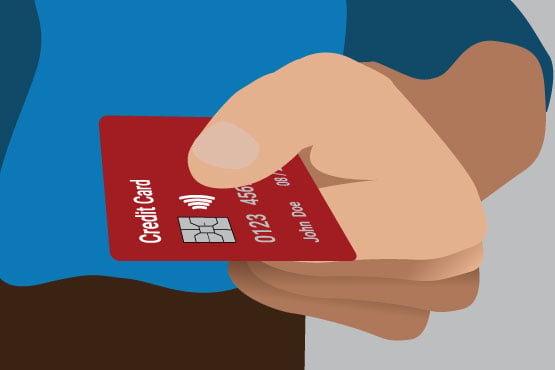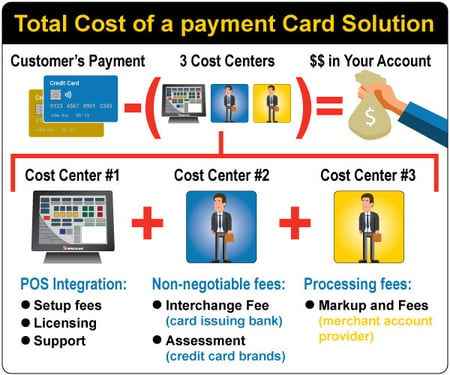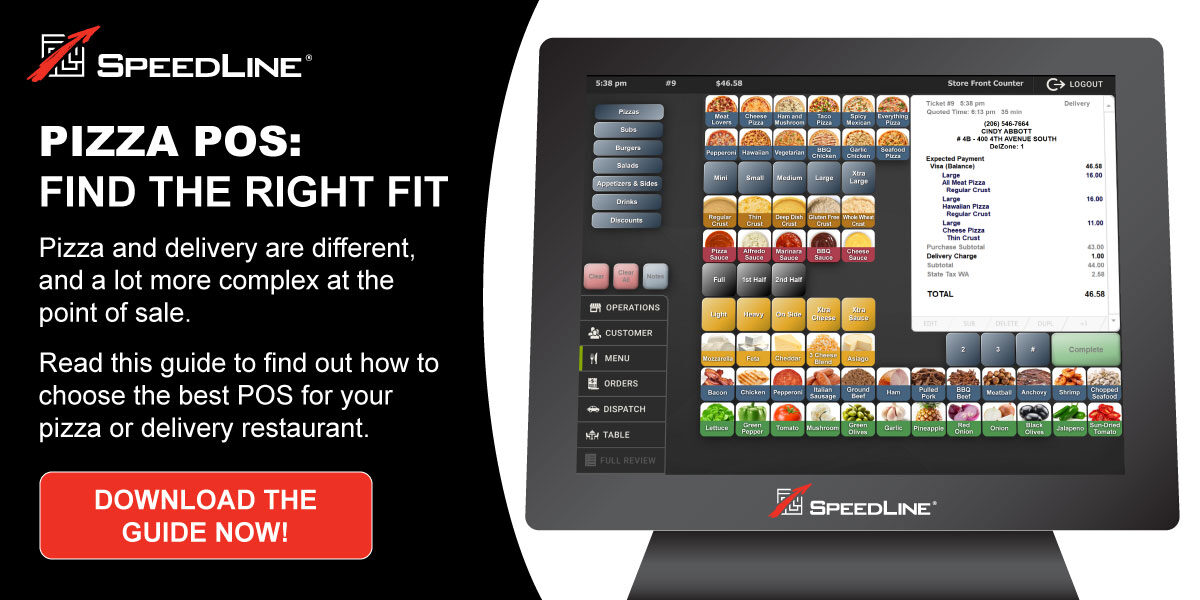Integrating credit card processing with your POS speeds service, simplifies bookkeeping, and saves time. But credit card processing fees take a bite out of your profit.
Are you getting the best deal? Understand the key cost centers in payment processing to find out whether you could be getting better credit card rates.
Credit Card Cost Center #1: POS Integration
When your customer pays with a card, payment information is sent to the card network for approval and processing.
Where You Can Save:
The cost of supported hardware, software setup, licensing, and technical support will vary from one payment processing company to the next. Ask your POS vendor about supported processors. Compare costs and services to secure the best deal.
But remember, there can be value in support and value-added services—and potential headaches if your processor offers limited service.
Credit Card Cost Center #2: Non-negotiable Fees
For every transaction, your payment processor pays your customer’s bank an interchange fee: a percentage of the dollar value of each transaction.
The interchange fee you pay will vary depending on whether you swipe, dip, or key in the card, or the customer enters the card number online. The type of card (debit, Visa, MasterCard, chip/non-chip, etc.), your business type, and total transaction volume also affect the percentage you pay. Each card company sets its own criteria for these rates and how they are applied.
Card companies also apply a fee called an assessment to cover their own operational costs.
Where You Can Save:
Assessments and interchange fees are non-negotiable. One way to save is by dipping or swiping cards rather than keying them in. Fees for card-present transactions are lower than for keyed-in transactions, since the risk of fraud is less when the cardholder is present.
Credit Card Cost Center #3: Merchant Account Provider Markup
This is where restaurant owners get confused—and often end up paying too much.
Your merchant account may be set up with a bank, a payment processor that specializes in moving funds between banks, or an independent sales organization or merchant service provider (ISO/MSP). This is the company that ensures your customers are billed and your restaurant is paid.
In addition, your merchant account provider underwrites your credit card purchases, pays interchange fees and assessments on your behalf, and assumes the risk for fraudulent or disputed charges. Some also provide value-added services such as web reporting, gift card processing, outage protection, and technical support.
Every bank, processor, and ISO pays exactly the same interchange fees and assessments on your behalf. Where you’ll see big differences is in the markup the merchant account provider adds to each transaction on top of the interchange fee. This final fee is sometimes referred to as a discount rate.
Some merchant account providers use tier pricing: they bundle their markup fee with the interchange fee and organize charges into qualified, mid-qualified, and non-qualified rates for various types of card payments. PIN processing has added even more tiers to this system. If your merchant account provider uses tier pricing, be on the lookout for extra fees and surcharges hidden in the bundled charges.
Other providers use interchange-plus pricing, also called cost-plus pricing: they charge the interchange fee plus an agreed upon markup. This markup often includes a percentage plus a transaction fee that is applied consistently to all transactions. Interchange-plus pricing is often cheaper than the tier system and makes it easy to see what interchange fee you pay for each transaction.
Merchant account providers may also collect other charges such as application, setup, and authorization fees, statement fees, annual fees, early termination fees, chargeback fees, and batching fees. These fees vary from provider to provider: make sure you understand which ones you’re paying.
Where You Can Save:
If your POS vendor integrates with more than one merchant account provider, shop around for the best rates and service:
- If your processor uses tiered pricing, make sure that you understand all the bundled fees—including setup fees and surcharges.
- Compare your total costs with providers that offer interchange-plus pricing. Factor in the total cost of your payment processing solution, including all fees and software support.
- Consider what premium you’re willing to pay for quality, available support. And evaluate what extra services are available—such as free gift/reward card processing or outage protection—to make sure you get the best value overall.
The rock-bottom rate may not be the best deal if your merchant account provider doesn’t support you adequately, but by comparing carefully you can ensure that you get the best rate for the services you need.
Posted on Mon, Oct 05, 2015 @ 07:10 AM.
Updated on June 27, 2022 @ 6:56 PM PST.




